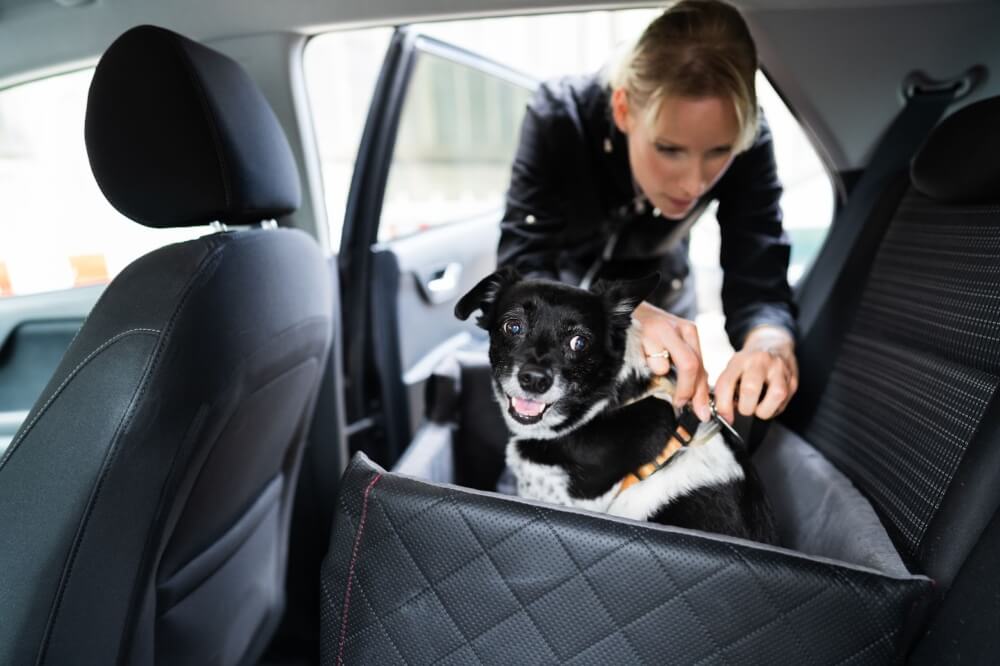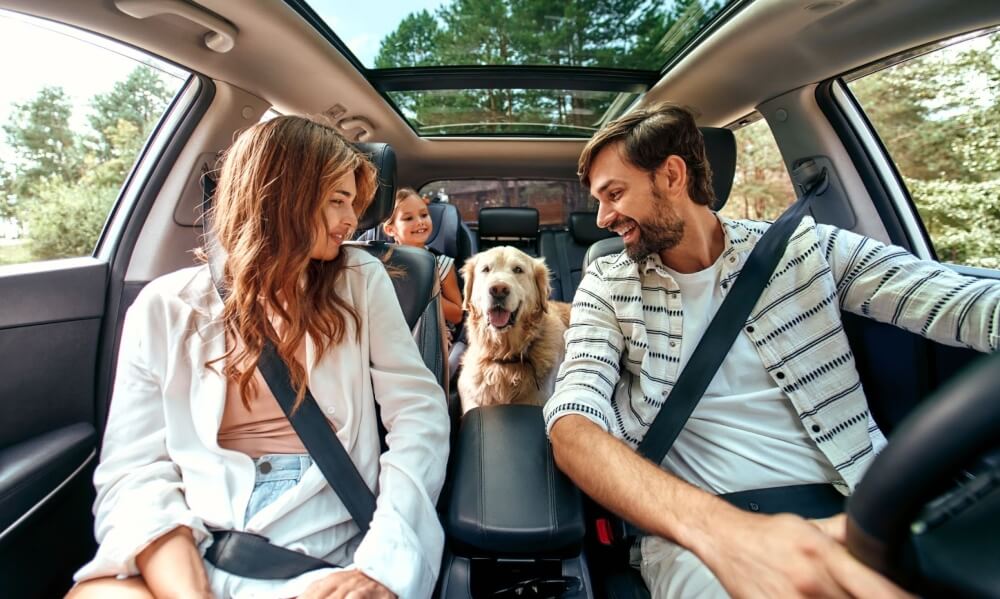One of our readers sent in a question to Dr. Weaver regarding motion sickness:
We adopted a rescue, Molly, around eight months of age, in July 2007. She was emaciated, flea-bitten, and had a lampshade cord wrapped tightly around her neck. She was so weak she couldn’t stand and weighed around 14 lbs. She is now a very happy and healthy dog at about 26 lbs.
I have been working with her to get her used to riding in our car. She shakes so severely and then throws up. I’ve given her Dramamine, and it doesn’t do anything. I took her today to get her nails trimmed (which I haven’t learned to do), and she threw up four times in the car. I’m almost 100% sure it’s psychological, not car sickness, although we live in the mountains of North Georgia. She’s a Jack Russell, maybe Beagle, or a hound. She’s a wonderful and brilliant dog, and I can’t seem to get her over the car thing. Will it help for the vet to give me some sort of tranquilizer and then ride her around until she realizes nothing terrible will happen? I’m a real estate agent and would love to take her with me sometimes, especially when I’m looking at land, etc., but it’s not worth it.
Carol Cowan
Response from Dr. Weaver
Dear Carol,
Unfortunately, what you are describing still sounds like motion sickness. Dramamine is not effective for all patients, but be sure you are not using the non-drowsy Dramamine, as it does not work either. Also, you may want to confirm with your vet that you are using an appropriate dose. Give it to your dog a good 1-2 hours before you get in the car. If it is not enough, your vet can prescribe a drug called chlorpromazine, which is often effective with more severe motion sickness. Unfortunately, even if you can control the symptoms, she will always find it challenging to be a riding-around dog partner because all these drugs will sedate her.
-Dr. Weaver
Unfortunately, what you are describing still sounds like motion sickness. Dramamine is not effective for all patients, but be sure you are not using the non-drowsy Dramamine, as it does not work either. Also, you may want to confirm with your vet that you are using an appropriate dose. Give it to your dog a good 1-2 hours before you get in the car. If it is not enough, your vet can prescribe a drug called chlorpromazine, which is often effective with more severe motion sickness. Unfortunately, even if you can control the symptoms, she will always find it challenging to be a riding-around dog partner because all these drugs will sedate her.
-Dr. Weaver
What is Motion Sickness in Dogs
Getting car sick can be an unpleasant experience for both humans and animals. There are usually two reasons dogs are affected by a ride in the car: physical or psychological, which might make them feel nauseous from being aboard the vehicle too long. They could also have anxiety attacks caused by being in close quarters with other people. Motion sickness in dogs is related to their sense of balance. This often happens with puppies, just as with young children, because the structures in the inner ear used for balance aren’t fully developed yet.
If your dog suffers from car-related anxiety, then she might associate the vehicle with being sick. There are many reasons why a dog may associate being in the car with unpleasant or traumatic things, like going to see their vet. Overall, canines with anxiety begin to relax as they mature and with conditioning tools.
Prevention Tips for Both Types of Pests
Motion sickness in dogs is not dangerous. However, it can cause some unwanted side effects. You might see your pup experiencing some of the following symptoms:
How to Prevent Fleas
- Whining
- Drooling (some may even start before getting into the car)
- Displaying uneasiness about getting into the car
- Shaking
- Diarrhea
- Yawning (anxious or nervous dogs sometimes yawn to calm down)
- Reluctant or unable to move
- Vomiting
- Panting excessively
How to Treat Motion Sickness in Dogs
Your vet may recommend medication to help with nausea and anxiety when all else fails, and they could also suggest a sedative if needed. The veterinarian will recommend a different treatment for each dog based on its individual needs and circumstances.
Some natural herbs and plants might help calm your dog down, such as lavender, ginger, or valerian. As always, we recommend you seek professional veterinary advice before administering any medication or herbal remedies on your own.
Training Your Dog to Keep from Getting Sick in the Car
If you want to train your dog to become less anxious and overcome nausea when riding in the car, you can take a few simple steps to achieve this.
First, start by putting the puppy in the car for a few minutes each day. This task will introduce your pup to the vehicle. Don’t turn on the car, just allow your dog to sit on your lap while you gently pet and give praise. After you’ve done this for a few days, turn on the car and keep the engine running for a short time. You can bring a toy or favorite blanket, so your puppy associates the car with fun and relaxation. Once again, you will do this step for a few days before moving to the next: riding the vehicle down your driveway or the street by your house. The key to getting your dog used to being in a car is slowly increasing the amount of travel. Start by taking short trips, maybe a trip to the dog park or visit friends who live close to you.
Always remember that if your pup gets sick, take a step or two back in the process until more tolerance in the car is built up. Stay calm and remember that sometimes dogs show signs of anxiety through whining, drooling, vomiting, or licking their lips. Keep your cool and try the next day again.

Tips for Making the Car Ride Enjoyable
- Try buying a special toy that only you give to the dog in the car. You could help him associate traveling with fun with this new toy.
- Windows should be down, even if only by an inch or two. Keeping the vehicle well ventilated and cool can reduce nausea.
- A good way of making car rides more enjoyable would be to bring an old tee shirt or even one of their favorite blankets. The scent of your home will relax and comfort your furry friend.
- Adjust where your dog sits. Rather than a window seat with the world blurry and zooming by, try placing him in the middle facing forward.
- Keep your pup safe and sound with a doggie seat belt or safety harness. Some pet owners prefer using solid-sided crates as a barrier to seeing the passing world.
- Make sure to restrict your dog's food intake before a car ride. If you can, withhold it for 12 hours before a ride in the car. Make sure that they have enough water available at all times, though.
- Take a short walk before getting in the car to help your pup relax.
- Make frequent stops if you're going on a long road trip. Allow your puppy to get out, stretch his legs, go potty, and play a little before hitting the road again.
While there is no one-size-fits-all answer to helping a dog overcome motion sickness, some general tips seem to be successful for many pet parents. Keeping your dog well-rested before a car ride, feeding them small meals throughout the day instead of one large meal, and avoiding stressful situations before travel can all help reduce the likelihood of your pup getting sick. If you have tried these tips with no success, or if your dog experiences severe or ongoing motion sickness, please consult your veterinarian for additional advice and possible medication options. Have you ever had to deal with motion sickness in your pup? What solutions worked best for you?











